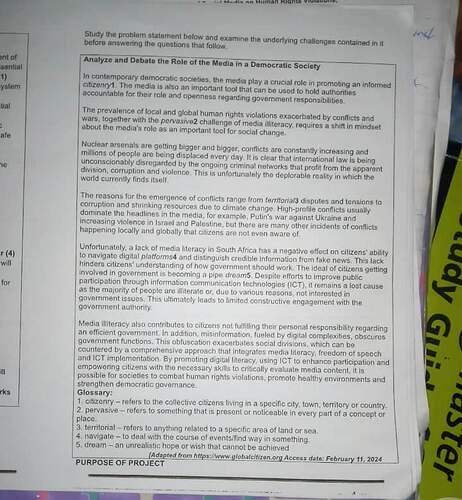The Impact of Social Media on Human Rights Violations, Social and Environmental Responsibility, and Democracy and Human Rights
Answer:
The screenshot provided seems to be the starting point of a conversation related to the impact of social media on various important aspects. However, without further context or information about Dimpho1’s statement or the subsequent discussion, it is difficult to provide a detailed analysis or insight into the conversation. To address the impact of social media on human rights violations, social and environmental responsibility, and democracy and human rights, it is crucial to consider various perspectives, case studies, and research findings. Each of these areas represents a complex interplay between social media platforms, individual users, governments, and societal norms.
In the context of human rights violations, social media can serve as a powerful tool for raising awareness, mobilizing support, and holding perpetrators accountable. Activists and organizations utilize platforms like Twitter, Facebook, and Instagram to shine a light on injustices, share testimonies, and gather support for human rights causes. However, social media can also be used by repressive regimes to spread disinformation, target dissidents, and suppress freedom of speech. Understanding the nuances of these dynamics is essential in exploring the overall impact of social media on human rights.
Regarding social and environmental responsibility, social media platforms have increasingly come under scrutiny for their role in perpetuating harmful practices such as spreading misinformation, enabling cyberbullying, and contributing to environmental degradation. Companies like Facebook, Google, and Twitter have faced criticism for their data privacy practices, algorithm biases, and the spread of fake news. On the other hand, social media has been instrumental in raising awareness about environmental issues, connecting like-minded individuals, and promoting sustainable practices. Balancing these dual roles of social media in fostering both social and environmental responsibility requires a multi-stakeholder approach involving tech companies, regulators, and civil society.
When it comes to democracy and human rights, social media has fundamentally transformed the way information is disseminated, opinions are shaped, and political decisions are made. On one hand, social media has empowered individuals to engage in public discourse, express dissent, and challenge authoritarian regimes. Platforms like Twitter and YouTube have played a crucial role in facilitating grassroots movements, organizing protests, and amplifying marginalized voices. However, concerns have been raised about the manipulation of social media for political purposes, the spread of hate speech, and the threat to democratic institutions. Striking a balance between promoting freedom of expression and combating online harms is a pressing challenge for policymakers and tech companies alike.
In conclusion, the impact of social media on human rights violations, social and environmental responsibility, democracy, and human rights is a multifaceted and evolving issue that requires ongoing attention, research, and dialogue. By critically examining the opportunities and challenges that social media presents in these domains, stakeholders can work towards harnessing the positive potential of digital platforms while mitigating their negative consequences.
